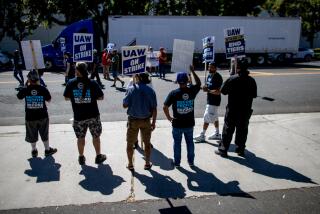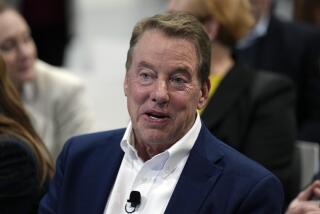Ford’s CEO has no regrets about call for bailout
- Share via
Detroit native Mitt Romney has long contended that the U.S. automobile industry would be better off had the federal government not bailed out General Motors and Chrysler. In particular, he argued in 2008 and again in February (while campaigning in Michigan’s Republican primary) that the companies should have restructured themselves without the feds’ involvement through a “managed bankruptcy” process.
But that ignores a crucial fact: Companies that are broke require money to keep operating, even while under the protection of a Bankruptcy Court. And as Ford’s chief executive, Alan Mulally, pointed out during a visit with The Times’ editorial board Tuesday, “There was nobody that was going to give them money for [debtor-in-possession] financing.”
Mulally’s comments weren’t offered as a criticism of Romney. Rather, he was defending Ford’s decision to go to Congress with GM and Chrysler in 2008 to call for a federal rescue. Ford didn’t need the money itself -- it had previously arranged a multibillion-dollar line of private credit. But Mulally said he believed then, just as he believes now, that GM and Chrysler threatened to drag the entire country into a depression.
“This could be upwards of 13% of the U.S. GDP if they were to go into freefall,” Mulally said. “We believed [seeking the bailout] was the right thing for the industry, the right thing for the United States of America.... I’d do the same thing today.”
Congress refused to step in, but the Bush administration lent GM and Chrysler billions to keep the companies in business until after the elections. Then the Obama administration led negotiations over a managed bankruptcy for each company, providing billions of dollars more for debtor-in-possession financing.
Romney has also criticized the way the administration handled those negotiations, accusing Obama of favoring the autoworkers unions over other creditors. But it’s a safe bet that neither company would be around today had Bush and Obama heeded Romney’s call to provide only funding for basic research and “guarantees for post-bankruptcy financing.” They wouldn’t have restructured; they would have liquidated.
As it turned out, GM and Chrysler have restructured, shedding debt, slashing labor costs and returning to profitability. Ford’s balance sheet has improved as well; according to Mulally, the company has repaid more than $21 billion of the $23.5 billion it borrowed to get through the downturn.
The bailout paid indirect dividends to Ford by averting the possible collapse of much of the industry’s supply chain. But there’s been one direct benefit as well, Mulally said.
Within a couple of weeks of the Big Three’s request for help, Mulally said, “98% of the people in America ... knew GM and Chrysler were bankrupt” and that Ford wasn’t. He added that more than half of U.S. consumers surveyed said that they were considering Ford for their next car purchase.
The episode resonates among car buyers to this day. Said Mulally, “The customers love that Ford didn’t take taxpayer money.”
ALSO:
Holder should keep his distance from Sharpton
Feeling left out of Romney’s vast left-wing conspiracy
With rivals in Michigan, Obama defends his Detroit bailout
More to Read
A cure for the common opinion
Get thought-provoking perspectives with our weekly newsletter.
You may occasionally receive promotional content from the Los Angeles Times.







